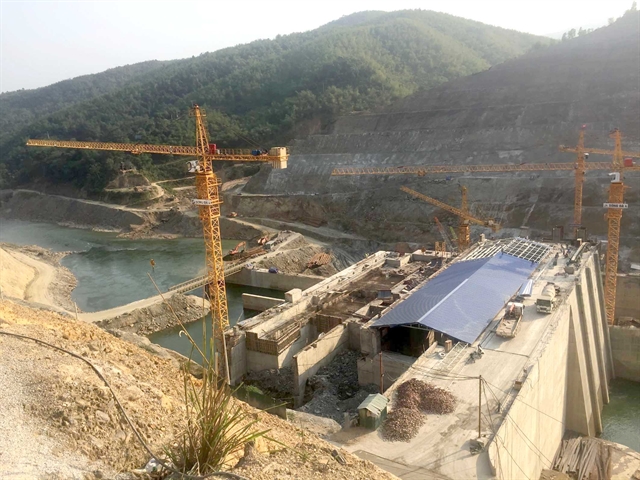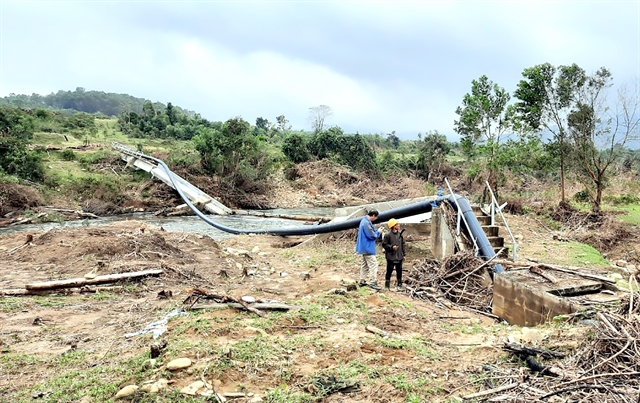 Society
Society

In Thanh Hóa Province, construction of the Hồi Xuân Hydropower Plant Project began in 2010, with its head investor, VNECO Hồi Xuân Investment and Electricity Construction JSC, obligated to develop resettlement for those affected by the project.

|
| An aerial view of the unfinished Hồi Xuân Hydropower Plant Project. — VNA/VNS Photo |
THANH HÓA/THỪA THIÊN-HUẾ — As hydropower plant projects continue to be developed across Việt Nam, many residents have been forced to relocate to new areas. However, these resettlements pose more challenges than simply a change of address.
In Thanh Hóa Province, construction of the Hồi Xuân Hydropower Plant Project began in 2010, with its head investor, VNECO Hồi Xuân Investment and Electricity Construction JSC, obligated to develop resettlement for those affected by the project.
Despite years of urging from local authorities, the company only began levelling the ground and constructing electrical lines for the 52 households in the resettlement in Sa Lắng Village, Phú Xuân Commune, Quan Hóa District in 2018.
While residents have lived in the area for years, they continue to experience a lack of facilities promised by the hydropower plant's head investor.
Phạm Bá Tuyển, a resident, told Thanh Niên (Young People) newspaper: “The company said that when we move here, they will support us with rice and food in the first few months to help us settle down, but we have been here for six years already and see no support at all.
“A certificate of land use rights is also not issued for us yet, so we can't divide the land lot for our children or borrow a loan from the bank.”
Phạm Bá Thống, another resident, said: “Embankments along the Mã River to protect the resettlement area, a cultural house, a football field, drainage ditches - the hydropower plant has not built any of those.
“At first, we residents required that they build an embankment first to ensure safety for the resettlement before we relocate, but then we agreed to move after much advocacy from the government. It has been six years already, and nothing has been done yet.
“The project also promised to support each household with VNĐ60 million (US$2,500) for relocation, but we received nothing. We all had to take money out of our own pocket.”
Cao Thanh Bình, head of the village, said: “Without a cultural house, for years, we have had to ask to use a local house for each village meeting, which is very inconvenient.
“People have repeatedly sent a petition to Thanh Hóa Provincial People’s Committee, but to this day, the constructions are still unfinished.
“The most urgent issues now are the embankments to ensure safety for the resettlement area and issuing land use rights certificate to people.”
Chairwoman of Phú Xuân Commune People’s Committee Phạm Thị Tuyết said: “The many opinions and petitions from the people are right.
“Local authorities also reported the situation to the higher management and the head investor of the Hồi Xuân Hydropower Plant Project, but they have also been in a difficult circumstance so, to this day, they still have not finished the planned constructions for the resettlement area.
"Now, the company has no personnel here.”
Nguyễn Đức Dũng, chairman of Quan Hóa District People’s Committee, said that the locality has recently reviewed all the constructions related to Hồi Xuân Hydropower Plant that needs to be completed, which will be reported to their superior.
Regarding the certificate of land use rights, Dũng said that the cause of the problem was the unfinished procedures for compensation and the land price difference between the original location and the resettlement, leading to incomplete dossiers for certificate issuance.
In February this year, following the visit to the project site, the chairman of Thanh Hóa Provincial People’s Committee Đỗ Trọng Hưng said that the unfinished and prolonged construction has “directly affected the socio-economic development of Quan Hóa District and Thanh Hóa Province, as well as the daily life of people at the project area.”
He has asked VNECO Hồi Xuân Investment and Electricity Construction JSC to arrange the capital and continue the project while coordinating with the local government to put forward solutions for people’s petitions.
Construction of the Hồi Xuân Hydropower Plant Project started in March 2010 on over 600 hectares, with VNĐ3,300 trillion ($140.5 million) as capital.
However, the project has been halted multiple times due to insufficient financial capacity. As of August 2018, the plant was 93 per cent completed and has been on pause to this day.
Difficult livelihoods
At the resettlement area of A Lưới Hydropower Plant in Thừa Thiên Huế Province, residents are still unable to settle down 12 years after relocation.
More than 170 households in A Sáp and A Đên hamlets in Hồng Thượng Commune are still facing numerous difficulties due to the barren soil unfit for agricultural production.

|
| A flood destroyed the upstream irrigation systems for Hồng Thượng Commune in December 2020. — VNA/VNS Photo |
A Viết Phượng, a resident in A Sáp Hamlet, said that she was allocated around 2,500sq.m of land for growing rice plants, but the lot was extremely infertile with little water supply.
She said: “Nothing grows, whether it’s vegetables, maize or cassava plants. For rice planting, there are only rocks and barely water, so there’s no success there.
“If we go out to work for others once or twice a month, then we can earn around VNĐ150,000 to 200,000 ($6.4-8.5), just enough to get through.”
Nguyễn Văn Trác, head of A Sáp Hamlet, said that the entire resettlement is in difficulty.
The hamlet has 85 households, of which 41 are poor, and 25 others are near poverty.
A Đên, the remaining hamlet in the resettlement area, is in the same situation. Of the 89 households in A Đên, 33 are poor, and 36 are near poverty.
Hồ Văn Khiếp, head of A Đên Hamlet, said: “I propose that the provincial authorities build a pumping station for the 15 hectares of fields that are currently abandoned.
“More production soil and fruit plant seedlings should be given to people for cultivation on this land.”
At a meeting discussing solutions for households affected by A Lưới hydropower project in 2021, Thừa Thiên-Huế Provincial People’s Committee also agreed on investing in an irrigation system for the parts of the area that could be improved for agricultural production.
A project worth VNĐ7.5 billion ($320,000) has been planned for this irrigation system, which the provincial People’s Committee has approved.
The project is now awaiting capital allocation and a medium-term public investment plan from the province for implementation.
For the parts that cannot be improved for agricultural production, the province also proposed the Central Hydropower JSC, the head investor of the hydropower plant, to support the local people. However, the company did not agree and said that compensation was finished.
A Lưới District People’s Committee is working on a plan to utilise this infertile land lot for an industrial zone.
When the plan is approved, the committee will conduct a land acquisition and compensation process so that people have a budget to switch to other professions.
Depending on the needs of local households, the committee also plans to convert the land acquired to provide new production land for them.
Construction for A Lưới Hydropower Plant officially started in June 2007 with a total capital of VNĐ3.2 trillion ($136.3 million). The plant went into operation in 2012.
For the project to be realised, Central Hydropower JSC spent nearly VNĐ293 billion ($12.5 million) on compensation and relocation, alongside VNĐ4.5 billion in support of production in the resettlement area. — VNS




